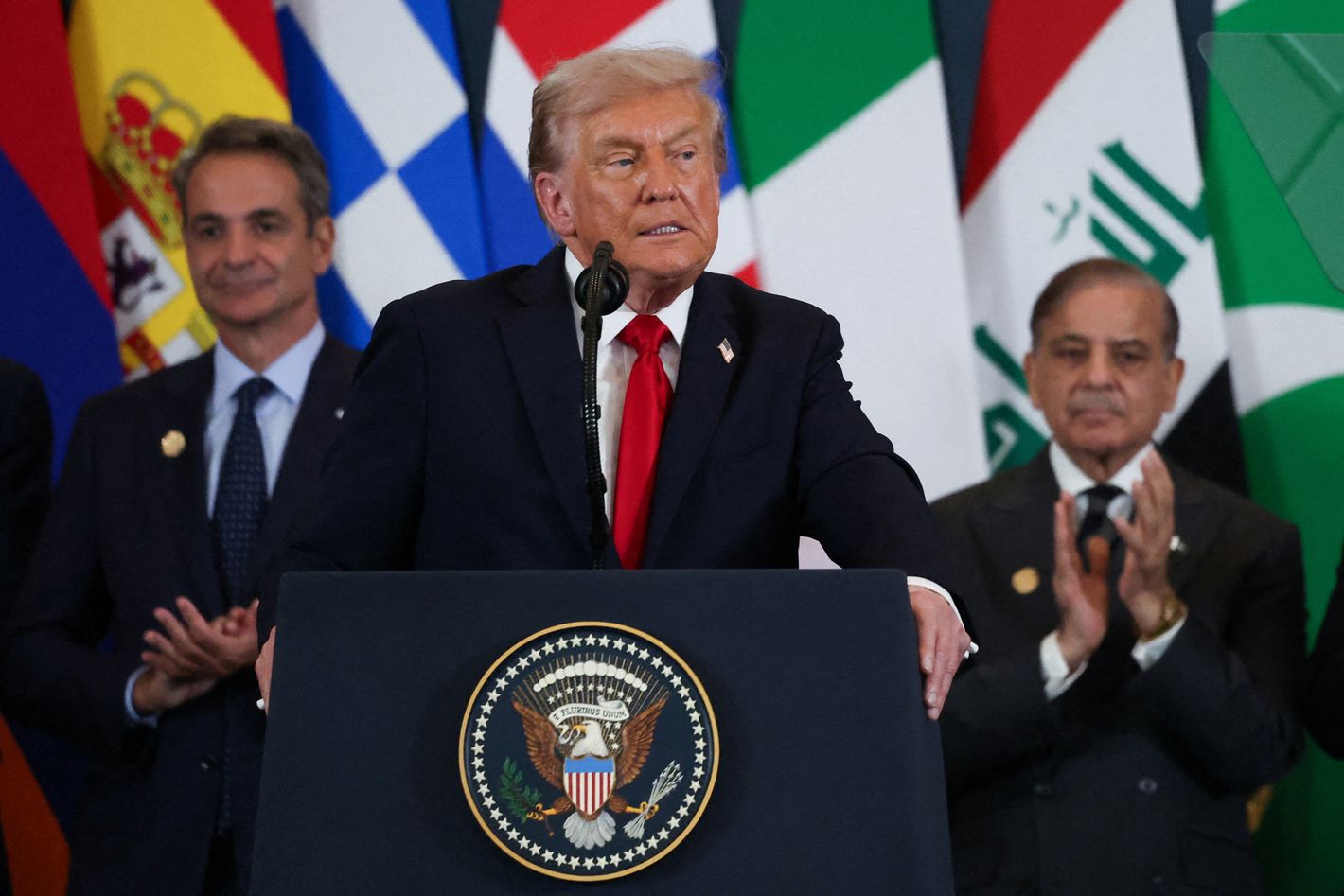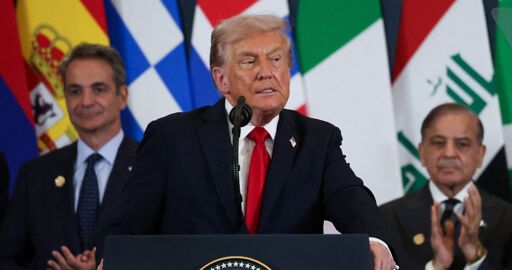
Photo: Suzanne Plunkett/Pool/AFP via Getty Images
It is difficult, in good conscience, to fully celebrate the cease-fire between Israel and Hamas when so many civilians have died in the conflict over the past two years. The horror of October 7, when Hamas slaughtered more than 1,100 Israelis and took several hundred hostages, led to what has been rightly characterized as a genocide: a total war against the people of Gaza, one that has killed more than 67,000 and immiserated almost every living Palestinian. Gaza is now smoldering rubble; the peace plan being enacted does not change this bare fact. There is blood, gobs of it, on the hands of President Donald Trump.
But even his harshest critics must concede that he was able (if many months too late) to accomplish what Joe Biden never would or could: Bring Israeli prime minister Benjamin Netanyahu to heel. In January, as he was leaving the White House, Biden brokered a brief ceasefire agreement as part of a hostages-for-prisoners exchange, but it was barely able to hold. Netanyahu did not want to stop the war. As long as Israel blasted Gaza away, Netanyahu could forestall long-running corruption charges and freeze out his political rivals. He could be a wartime kingpin, Israel’s eternal strongman, and keep granting himself new political life. Netanyahu bet, in 2024, he could drag on the war long enough to outlast Biden, who led a Democratic Party that was increasingly skeptical of his government, in favor of an even friendlier Trump White House. In Trump’s first term, he had moved the American embassy to Jerusalem and never, for a moment, offered any serious resistance to Netanyahu or Israel. The occupation of the West Bank continued apace and Gaza suffered in the shadows.
Trump, however, has always been a transactional president when it comes to foreign governments. His beliefs are never held entirely firm; he views diplomacy like New York real estate, with deals to be had and favors to be traded. Trump is nothing like the peacemaker his fervent allies and supporters believe him to be — the military-industrial complex looms large across Earth, and Trump is currently carrying out extrajudicial killings in Venezuelan waters — but he is not, like past Republican presidents, a neoconservative who is eager for fresh conflict. He does not dream of the same empire building, and he can be only so devoted to Netanyahu personally. Whereas other prominent Republicans, including Ted Cruz and Lindsey Graham, would never dare cross the Israeli prime minister, Trump’s deference has its limits, especially when Israel is launching rogue strikes on Qatar and threatening America’s Middle Eastern allies. (Trump friends and family want to get richer in the region, after all.)
And so a tentative peace was struck: exchanging hostages for prisoners, with Egypt, Turkey, and Qatar serving as mediators. There is a hazy future of a technocratic Palestinian committee governing Gaza without Hamas. Netanyahu, notably, has not yet declared the war over. There are many, many details still to be worked out.
Still, a stark question facing Democrats is why the Biden administration could not achieve a version of this agreement during the entirety of 2024. Jake Sullivan and Antony Blinken, the architects of Biden’s foreign policy, must answer for their failure. More crucially, though, Democrats must consider why Biden himself could not do more. One discomforting possibility is that the elderly president simply wasn’t mentally fit enough to conduct aggressive foreign policy. Biden’s capacity was much diminished — this was apparent as early as 2022, though most Democrats pretended otherwise — and it’s in the foreign arena in which an executive’s weakness is most felt. Domestically, presidents can farm out a good deal of governing to advisers, Cabinet members, and congressional leaders. Top Biden aides like Ron Klain and Jeff Zients could effectively serve as shadow presidents, working in concert with Chuck Schumer and Nancy Pelosi. Abroad, the president as an individual matters much more. If Biden himself cannot cajole or threaten Netanyahu, his aides can only do so much.
This does not absolve Blinken, Biden’s secretary of State, or Sullivan, Biden’s national security adviser. There’s little evidence to suggest they were ever willing to pressure Netanyahu and force him to pull back. Biden had great reverence for Israel, and he could never evolve to understand that Netanyahu commanded a reactionary government. His aides weren’t up for convincing him of this reality, either. As Biden faded, Netanyahu escalated the war, and he never feared Biden might come to treat Israel for what it is: an American client state. Trump still defers far too much to Netanyahu, but he began to grow impatient in the past few months. The war in Gaza wasn’t benefiting Trump politically. He had become interested in winning the Nobel Peace Prize, and sometimes venal self-interest can do a little good. Without such a laurel dangling in front of Trump, he might not have tried so hard.
Will Trump actually win a Nobel? There are too many open questions when it comes to the future of Israel and Gaza. It is hard, at the very minimum, to justify such an award when so many Palestinians are dead, thousands of them shot and bombed and starved after Trump took office. Trump, at least, was not president when the war began and first spiraled out of control. Biden had a chance to wrench history in a different direction and failed. If he is cognizant at all of the events over the past week, he should feel regret and shame.
From Intelligencer - Daily News, Politics, Business, and Tech via this RSS feed

